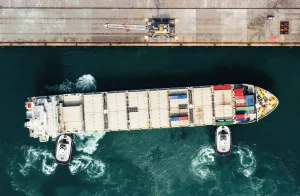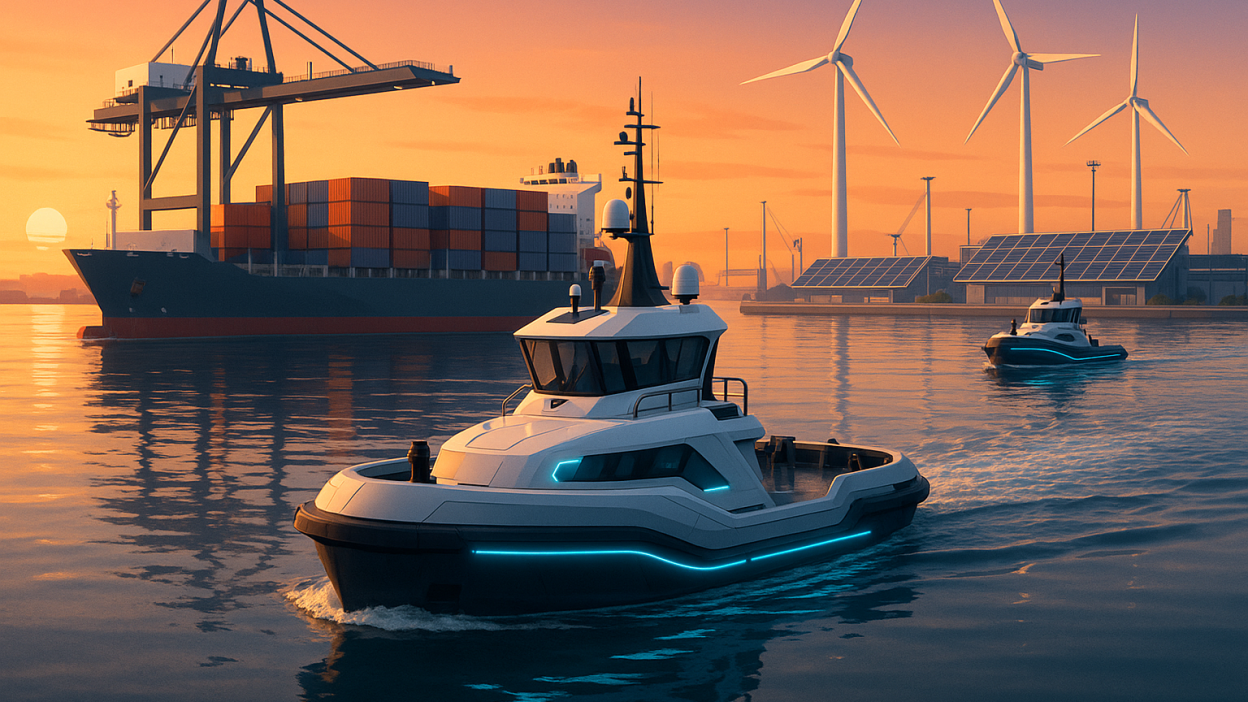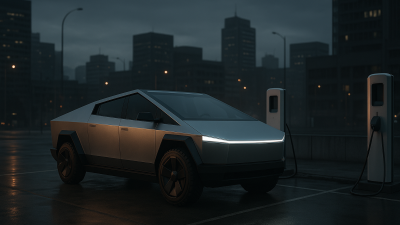Arc Wins Its First Major Contract with a $160 Million Order for Electric Tugboats
Arc, a fast-growing player in the sustainable marine technology space, has reached a pivotal milestone by securing its first major commercial contract—a $160 million order for electric tugboats. The agreement not only signifies the company’s technological readiness but also reflects broader shifts in the shipping industry, where environmental concerns and regulatory pressures are pushing operators to rethink their reliance on fossil fuels.
The electric tugboats promised by Arc are expected to be deployed across key port facilities, offering a cleaner, quieter, and more efficient way to assist cargo vessels in docking and maneuvering. This breakthrough could pave the way for sustainable shipping solutions worldwide, especially as ports, shipping companies, and governments align to reduce carbon footprints.
A Landmark Moment for Arc and Maritime Sustainability
Until now, Arc had been primarily engaged in research and development, focusing on proving that electric propulsion systems could meet the performance requirements of port logistics without relying on traditional fuels. The $160 million order marks a significant transition from prototype development to full-scale production and deployment.
“This is more than just a contract—it’s a validation of electric marine technology,” says industry analysts. “It signals that operators are willing to invest heavily in sustainable alternatives to meet stricter environmental regulations and customer expectations.”
Arc’s electric tugboats are among the first in the industry to offer scalable solutions that can replace diesel-powered vessels without compromising operational efficiency or safety.
Why Ports Are Embracing Electric Tugboats

Ports are among the largest contributors to localized air pollution, particularly in densely populated coastal cities. Diesel engines, long the backbone of harbor logistics, are noisy, expensive, and harmful to both human health and the environment.
Electric tugboats offer a solution to these problems by providing:
1. Zero Direct Emissions
Electric propulsion systems eliminate tailpipe emissions during operation, helping ports meet strict air quality standards and align with global decarbonization efforts.
2. Lower Operating Costs
Electric tugboats have fewer moving parts, reducing maintenance needs and eliminating fuel costs associated with diesel engines. Over their lifespan, these vessels can offer significant savings.
3. Reduced Noise and Vibration
Diesel engines are notoriously loud, creating harsh working environments for port staff and nearby communities. Electric systems operate smoothly and quietly, improving worker safety and comfort.
4. High Efficiency and Smart Energy Management
With regenerative braking, advanced battery management, and optimized propulsion systems, electric tugboats can operate longer and recover energy during maneuvering, reducing overall power consumption.
The Clients Behind the Contract
While Arc has not disclosed the specific clients involved in the $160 million deal, sources indicate that the agreement is led by a coalition of port authorities and logistics providers in Europe and North America. These regions have been early adopters of sustainable infrastructure, supported by government subsidies, climate action initiatives, and investor interest in reducing carbon exposure.
For instance, major port hubs like Rotterdam, Los Angeles, and Antwerp are under increasing pressure to transition to low-emission technologies. With Arc’s electric tugboats, these ports can meet ambitious emission reduction targets while improving operational efficiency.
How Arc’s Technology Works
Arc’s electric tugboats are powered by modular lithium-ion battery packs, allowing ports to scale capacity based on specific operational needs. Key innovations include:
-
Smart Propulsion: The system adjusts thrust based on load and movement, ensuring optimal energy use.
-
Regenerative Systems: Energy generated during braking and maneuvering is recaptured and stored, extending operational time.
-
Remote Monitoring: Ports can track vessel performance in real time, scheduling maintenance before breakdowns occur.
-
Adaptable Design: The tugboats are built to work with existing dockside infrastructure, requiring minimal retrofitting.
These features allow Arc’s vessels to perform complex maneuvers such as docking large container ships or adjusting course in tight spaces—tasks historically managed by powerful diesel engines.
The Environmental and Economic Impact
According to estimates from industry experts, electrifying even a small fraction of port tug fleets can lead to significant reductions in greenhouse gas emissions. For example:
-
A single electric tugboat can save up to 300 metric tons of CO₂ annually compared to diesel alternatives.
-
Operational cost reductions of up to 20% are expected over the vessel’s lifetime.
-
Noise pollution in harbor zones can be reduced by 50% or more, benefiting port workers and nearby communities.
Beyond emissions, ports can use electric tugboats as a gateway to broader sustainability initiatives—pairing clean energy with renewable power grids, smart logistics, and automated fleet management systems.
Challenges and Considerations
Despite the excitement, transitioning to electric tugboats comes with challenges:
Battery Sustainability
The lifecycle of battery packs, from mining raw materials to disposal, requires careful management to ensure that the environmental benefits aren’t offset by supply chain impacts.
Infrastructure Upgrades
Ports need to invest in charging stations and high-capacity electrical grids capable of supporting new fleets. This requires coordination with energy providers and long-term planning.
Regulatory Compliance
Although emission targets are tightening globally, port authorities must ensure that new electric systems meet safety and performance standards across regions.
Workforce Training
Operators and maintenance staff will need training to work with new propulsion systems and manage digital monitoring tools effectively.
Arc’s leadership has emphasized partnerships with energy firms, regulatory bodies, and local governments to ensure that these challenges are addressed collaboratively.
The Road Ahead for Arc
This $160 million contract is expected to accelerate Arc’s growth trajectory. With production ramping up, Arc is looking to expand its presence in additional markets, including Asia and South America, where emerging port infrastructure offers new opportunities.
The company is also investing in research to enhance battery efficiency and explore hybrid-electric solutions for larger vessels, signaling its ambition to become a cornerstone in global sustainable shipping efforts.
Arc’s first major order for electric tugboats represents a turning point for both the company and the maritime industry as a whole. As ports worldwide face increasing pressure to reduce emissions and modernize infrastructure, electric propulsion offers a practical, cost-effective, and environmentally friendly alternative to diesel-powered vessels.
With its innovative technology, strategic partnerships, and growing market demand, Arc is poised to lead the shift toward sustainable shipping solutions—one tugboat at a time.
The future of maritime logistics is electric, and Arc’s groundbreaking contract is helping chart the course.
FAQs Section:
Q1: Why are electric tugboats important for the shipping industry?
A: Electric tugboats reduce emissions, noise, and maintenance costs compared to diesel-powered alternatives, helping ports meet environmental regulations while improving efficiency.
Q2: How will Arc’s electric tugboats benefit ports?
A: Ports can lower operational costs, reduce pollution, and enhance safety while transitioning to greener infrastructure without large-scale system overhauls.
Q3: What makes Arc’s technology stand out?
A: Arc’s modular battery systems, regenerative braking, and smart propulsion technology offer high performance and adaptability for diverse port environments.
Q4: Who is backing this contract?
A: While specific clients remain confidential, the deal involves a consortium of ports and logistics providers focused on sustainability and operational efficiency.
Q5: What are the challenges in adopting electric tugboats?
A: Key challenges include upgrading charging infrastructure, ensuring battery sustainability, and navigating evolving maritime regulations.
Stay Updated on Green Shipping Innovation – Join Our Newsletter for the Latest on Electric Tugboats, Sustainable Ports, and Maritime Technology!



